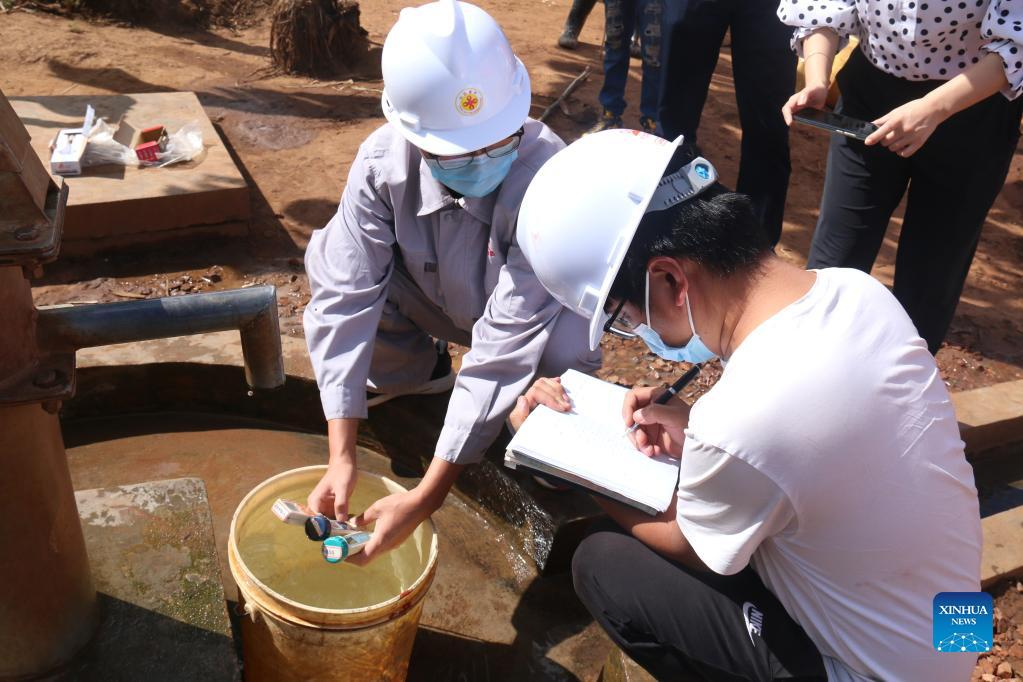
Chinese staff members check the water quality of a borehole in Gatsibo district, Eastern Province, Rwanda, on April 11, 2022. (Photo by Huang Wanqing/Xinhua)
KIGALI, May 6 (Xinhua) -- Thousands of residents in eastern Rwanda once did not have easy access to clean and safe water due to recurrent drought.
In the Rwinkwavu area in Kayonza district, Eastern Province, for instance, residents were forced to walk long distances to reach the nearest clean water source.
Water woes are now a thing of the past, thanks to a China-funded 200-borehole drilling project mostly focused on addressing water scarcity in the province. The drilling project, contracted by construction and engineering giant China Geo-Engineering Corporation (CGC), has been tested and commissioned following its recent completion, benefiting 110,000 people.
Residents in several districts in the province said in separate interviews with Xinhua that potable water needs are no longer a problem in their localities.
Residents in the above-mentioned Rwinkwavu area in Kayonza district, Eastern Province, now have access to a solar-powered borehole, which provides clean and safe water.
At GS Rwinkwavu school, also one of the beneficiaries, administrators said the newly installed borehole will help them achieve their education goals.
"This project came at the right time to address a serious water problem. Besides being free, the water flows easily unlike the hand borehole. It has helped students as well as teachers and neighbors. We are excited about it," said Magnifique Habimana, the head teacher of GS Rwinkwavu.
He recalled that bathing, washing clothes and general hygiene maintenance were challenging at school before the solar-driven borehole was drilled.
"It was a very big inconvenience to the school in terms of sanitation and running costs," said Habimana. "Our only option was to hire people to fetch water for cooking and drinking. But this was not sustainable, it was a costly option."
The school's sanitation and hygiene standards have now improved with the new water source, which has a designed capacity of serving 600 people, said Habimana. "We thank the Chinese government for maintaining cooperation with Rwanda which enabled the implementation of this water project. With this water, we can do farming activities for all seasons because we have water to irrigate the crops."
Prosper Manikuze, the standards and quality control specialist in Rwanda's Water and Sanitation Corporation (WASAC), who has closely followed the project, said the contractors have delivered quality work.
"I appreciate the quality of this project because the contractors took an initiative to install standard borehole handles and heads. The mixing of cement ratio was also good for concrete works. It was built with strong materials," he said.
Manikuze said GS Rwinkwavu previously had no water as a manual borehole in place was not functional, but even though it was working it would not satisfy the high water demand. "With the solar-powered borehole facility at the school, there will be no students missing school anymore to go and fetch water which we hope will boost education standards," he said.
Clarisse Uwera, a resident of Murambi in Gatsibo district, also in East Province, said getting water for drinking, cooking and washing clothes at her home has been eased. "Before it was a challenge. The newly installed water source benefits many people, about 300 people in this village. I'm very thankful to have access to this borehole. There is no need to worry anymore about water."
Jean Damascene Harelimana, the vice mayor of Kayonza district in charge of social affairs, said the newly installed boreholes will positively impact the health and wellbeing of many people.
"We are all happy about the water project. We are also happy about the cooperation of Rwanda and China which leads to an extension of services to people," he said.
Lack of access to clean water increases the risk of outbreaks of waterborne disease, including acute watery diarrhea and diseases such as cholera.
Diarrheal disease, often caused by bacteria ingested through contaminated food or water, is the second leading cause of death in children under five, according to the World Health Organization (WHO).
Chen Jinke, the manager of the Chinese borehole drilling project, said the boreholes are well protected and the impact is good.
The wells are installed with chlorination systems to keep the water clean and ready to drink, and solar wells are built in places with a high concentration of people such as markets and schools, according to Chen.
"The boreholes using solar energy are good since Rwanda has good sunshine intensity which can meet the conditions of using solar wells. Compared with the manual system, the solar borehole can ensure reliable water supply to the surrounding villages," he explained. ■
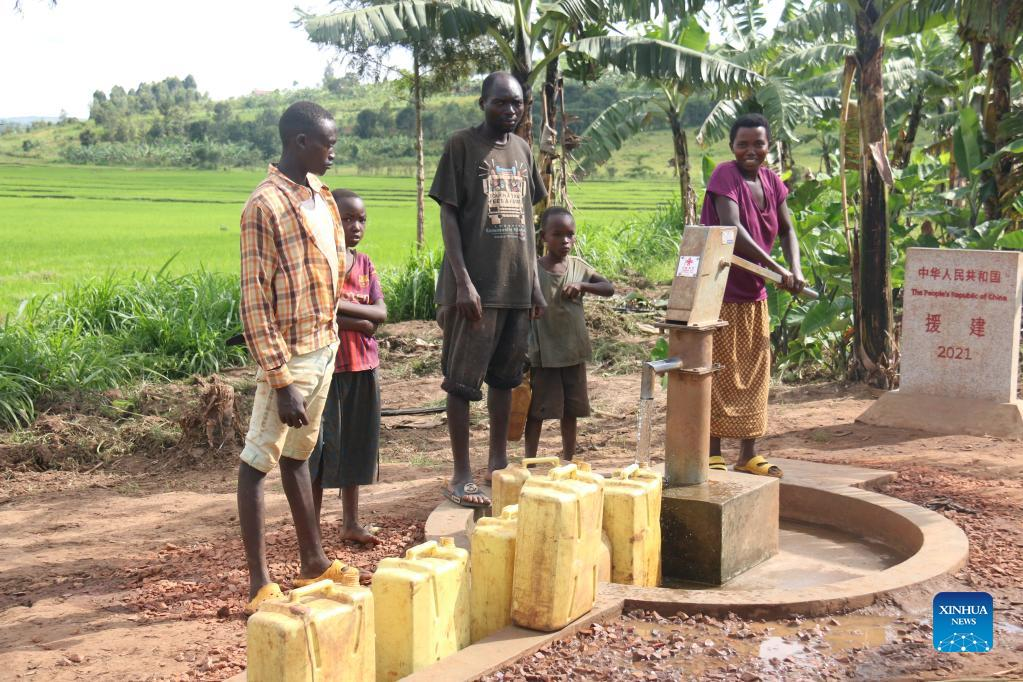
Reisdents fetch water from a borehole in Gatsibo district, Eastern Province, Rwanda, on April 11, 2022. Thousands of residents in eastern Rwanda once did not have easy access to clean and safe water due to recurrent drought. In the Rwinkwavu area in Kayonza district, Eastern Province, for instance, residents were forced to walk long distances to reach the nearest clean water source. Water woes are now a thing of the past, thanks to a China-funded 200-borehole drilling project mostly focused on addressing water scarcity in the province. The drilling project, contracted by construction and engineering giant China Geo-Engineering Corporation (CGC), has been tested and commissioned following its recent completion, benefiting 110,000 people. (Photo by Huang Wanqing/Xinhua)
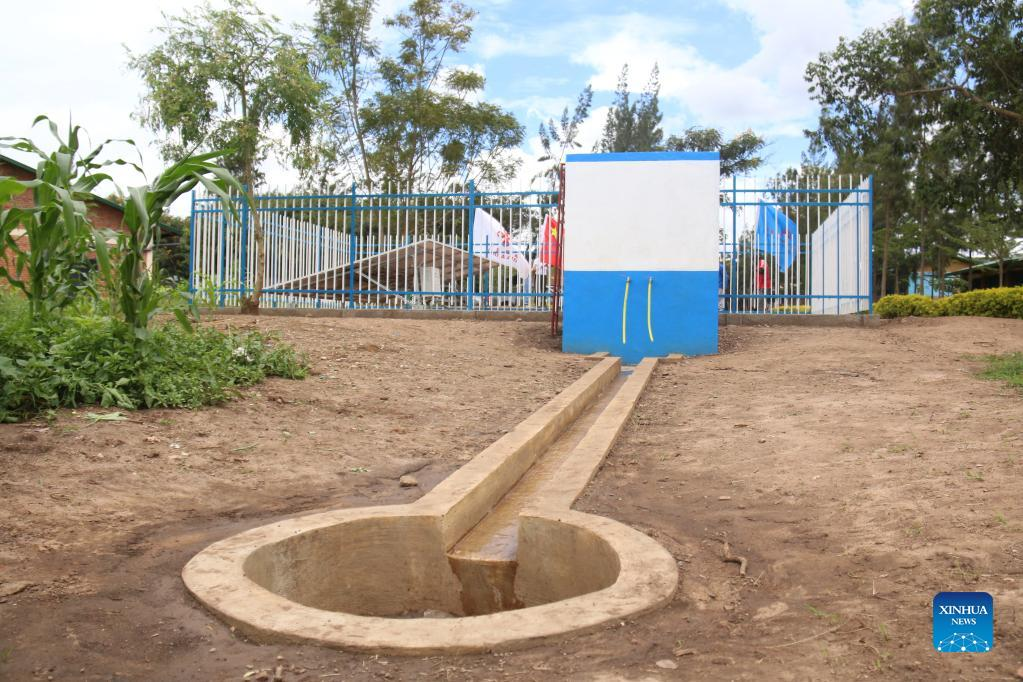
Photo taken on April 28, 2022 shows a solar powered borehole in Kayonza district, Eastern Province, Rwanda. Thousands of residents in eastern Rwanda once did not have easy access to clean and safe water due to recurrent drought. In the Rwinkwavu area in Kayonza district, Eastern Province, for instance, residents were forced to walk long distances to reach the nearest clean water source. Water woes are now a thing of the past, thanks to a China-funded 200-borehole drilling project mostly focused on addressing water scarcity in the province. The drilling project, contracted by construction and engineering giant China Geo-Engineering Corporation (CGC), has been tested and commissioned following its recent completion, benefiting 110,000 people. (Photo by Huang Wanqing/Xinhua)
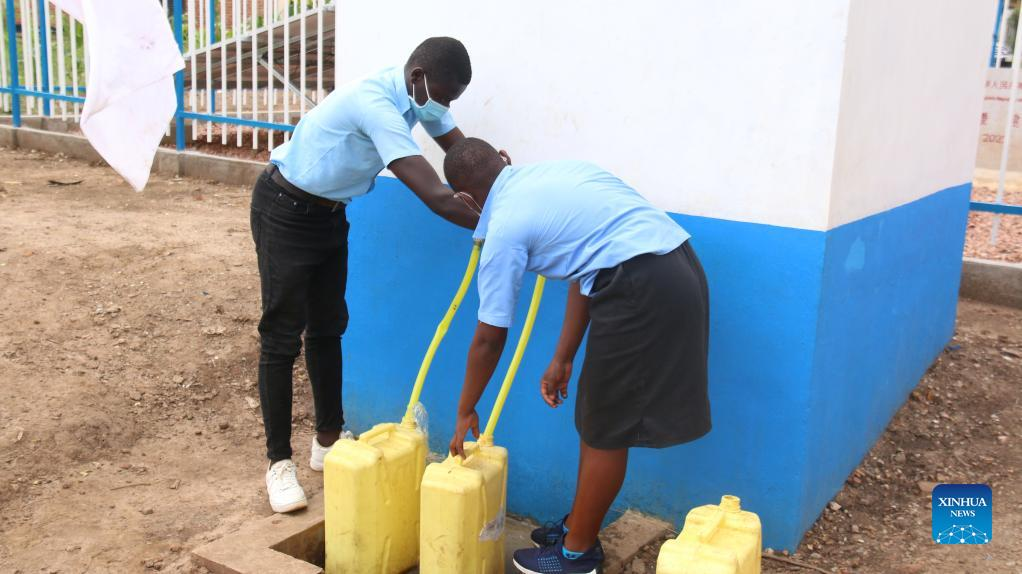
Students fetch water from a solar powered borehole in Kayonza district, Eastern Province, Rwanda, on April 28, 2022. Thousands of residents in eastern Rwanda once did not have easy access to clean and safe water due to recurrent drought. In the Rwinkwavu area in Kayonza district, Eastern Province, for instance, residents were forced to walk long distances to reach the nearest clean water source. Water woes are now a thing of the past, thanks to a China-funded 200-borehole drilling project mostly focused on addressing water scarcity in the province. The drilling project, contracted by construction and engineering giant China Geo-Engineering Corporation (CGC), has been tested and commissioned following its recent completion, benefiting 110,000 people. (Photo by Huang Wanqing/Xinhua)
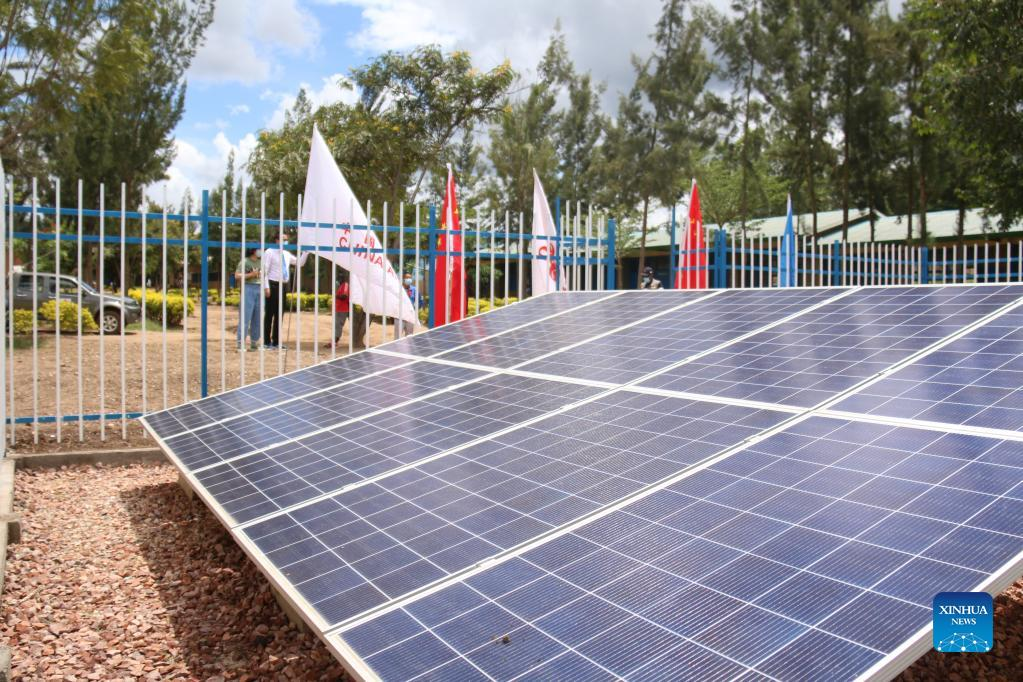
Photo taken on April 28, 2022 shows a solar panel of a solar powered borehole in Kayonza district, Eastern Province, Rwanda. Thousands of residents in eastern Rwanda once did not have easy access to clean and safe water due to recurrent drought. In the Rwinkwavu area in Kayonza district, Eastern Province, for instance, residents were forced to walk long distances to reach the nearest clean water source. Water woes are now a thing of the past, thanks to a China-funded 200-borehole drilling project mostly focused on addressing water scarcity in the province. The drilling project, contracted by construction and engineering giant China Geo-Engineering Corporation (CGC), has been tested and commissioned following its recent completion, benefiting 110,000 people. (Photo by Huang Wanqing/Xinhua)
